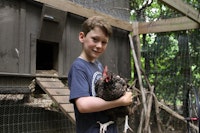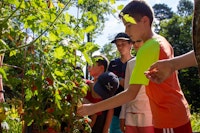F.A.R.M. Fresh Omelets!

Being able to harvest and cook your own food straight from an organic garden is a rare luxury for many of us, but yesterday the boys at the F.A.R.M. got a “taste” of what that’s like! F.A.R.M. stands for Food, Animals, Repurposing, and Manpower - all things that we learn about and use in the program. Throughout the summer, boys care for the chickens, learn about composting and repurposing materials to reduce waste, use manpower instead of machinery, and grow different kinds of food.
Yesterday morning, the boys cooked omelets using only ingredients harvested from the garden. They started with the most important part of an omelet: eggs! The boys love holding the chickens and hanging out with our flock. One camper, Elliot, picked up several very calm chickens and the other boys in the activity started calling him the “chicken whisperer”! After saying good morning to the hens in the coop, they checked to see if any eggs had been laid since the day before. Luckily, there were plenty!

The boys collected them, and we talked about why these eggs don’t have to be refrigerated before we eat them. When chickens lay an egg, their bodies created a protective layer over the shell, called the “bloom.” This invisible coating protects the shell and doesn’t let any bacteria get inside the thousands of tiny shell pores. However, if the egg gets washed it will wash off the “bloom,” causing it to need refrigeration. Unwashed eggs at room temperature can stay fresh for a couple of weeks, but putting them in the refrigerator will prolong their shelf life. Some of the eggs we ate yesterday were just hours old - about as fresh as you can get!

The next step in the omelet making process was harvesting the vegetables and seasoning. We walked around the different beds in the garden, talking about what was growing in each. Some things like the strawberries, cucumbers, and squash wouldn’t make great omelet filling, but others were more ideal!
The boys picked tomatoes, bell peppers, basil, and sage. Some with more adventurous taste buds also picked the jalapenos and habanero peppers to add spice!

All the boys took turns cracking and whisking the eggs in the frying pan, using a camping stove to cook the omelet. We put spicy toppings on only half, so boys could try them if they wanted to, but didn’t have to. I was surprised by how many preferred the spice! When the omelets were finished, everyone was commenting on how good they smelled. We cut them into pieces to share, and most boys came back for seconds! It was a fun experience to eat something so fresh where all the ingredients where collected by hand. After seeing how eager the boys were to help prepare the omelets, maybe some of them will even be inspired to help cook at home!

By this point in the session, you might be getting some letters home, describing these activities or detailing new friends and cabinmates. While we know that many letters will contain fun stories about new activities and trips, we also know that many will share feelings of missing home or feeling upset. We wanted to make a note of encouraging you as parents in case a few have begun to receive homesick “snail mail” letters, reflecting boys’ feelings during the first few days of settling in at camp.
Now that the boys have been here for a couple of days and camp is still new to them, this can be a time when homesickness could begin to show in some of them. Homesickness is completely normal and we’re prepared to work with each boy, as no situation is the same.

Our counselors are great at working through homesickness with campers, and some of them can speak from experience after overcoming these same feelings themselves as campers. We wrote a blog about which you can read here.
If you do get a homesick letter in the mail over these next few days, don’t panic. These feelings are common for all campers at some point throughout the session. The challenging times for them can be when things are moving at a slower pace, such as during rest hour or at night. This is also usually when they have the most time to write home!

Your boys are making their own decisions here at camp on what activities they want to take, walking themselves to the classes, signing up for trips, learning new skills, and making friends. These life lessons learned at camp can help in many situations back home where they may be the new boy in school, moving to a new neighborhood, or even later when preparing for college.
Please be assured that if your son shows any continuing signs of homesickness, we will be in touch with you. A good rule of thumb typically is that no news from us is good news, and the homesickness usually passes quickly. Getting them doing things is the quickest way to get their mind off of home and distracted by the fun trips and activities. The boys are learning to be independent and resilient, and you are giving them a great opportunity to do that by allowing them to be at camp.
We’re looking forward to another great day at camp today!